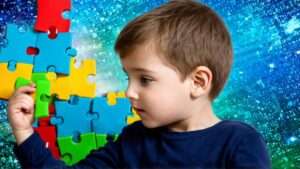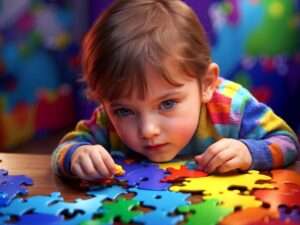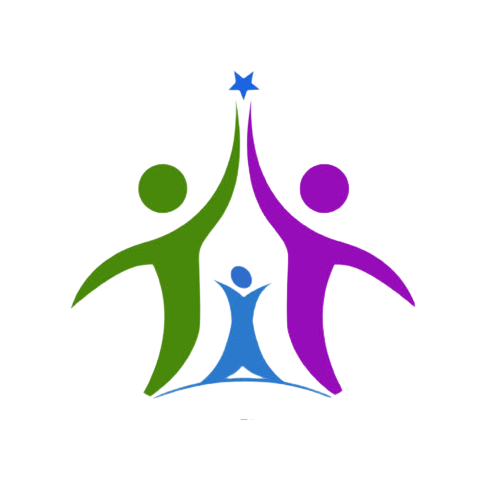Introduction
Autism awareness has grown significantly in recent years, leading to better understanding and support for families. Early signs of autism can often be subtle, including delayed communication and social interaction issues. Recognizing these signs is crucial, as early diagnosis of autism can lead to timely interventions that significantly improve developmental outcomes. By understanding the autistic behaviors and characteristics in toddlers, parents can seek assessments sooner, paving the way for effective strategies and resources to support their child’s growth and development. Make sure to read the whole post to complete understanding !
1. Delayed Communication and Language Skills:

1.1. Limited or No Speech Development
One of the earliest indicators of autism in toddlers can be limited or no speech development. Signs may include a child not speaking any single words by 16 months or failing to use two-word phrases by the age of 2. Parents should monitor these milestones closely, as delays in speech can be a significant early sign of autism. Early intervention can help improve communication skills, leading to better social interactions and overall development.
1.2. Lack of Non-Verbal Communication
Children with early signs of autism may exhibit a lack of non-verbal communication. This can manifest as difficulty using gestures, such as pointing or waving, which are crucial for expressing needs and emotions. Additionally, these children may struggle to mimic sounds or facial expressions, limiting their ability to engage in social interactions. Recognizing these signs early allows parents to seek appropriate assessments, enabling timely support and strategies to encourage better communication skills in their child.
1.3. Difficulty in Understanding Language
Toddlers showing early signs of autism may exhibit a difficulty in understanding language. This can be evident through struggles with following simple instructions or recognizing familiar words. For instance, a child might not respond when asked to perform a basic task, such as “come here” or “give me the ball.” Recognizing these challenges early allows parents to seek evaluations and support, which can help enhance their child’s comprehension and communication abilities.
2. Challenges with Social Interaction:

2.1. Limited Eye Contact and Facial Expressions
A significant challenge for toddlers with early signs of autism is limited eye contact and facial expressions. These children may avoid direct eye contact during interactions, which can hinder their ability to connect with others. Additionally, they might not use appropriate facial expressions to convey emotions, making social engagement difficult. Recognizing these signs can help parents seek early intervention strategies that encourage better social communication.
2.2. Difficulty Engaging with Peers or Family
Children showing signs of autism often exhibit difficulty engaging with peers or family. They may show little interest in playing with other children or may prefer to play alone. This lack of interaction can impact their social development and relationships. Early recognition of these challenges enables parents to provide opportunities for guided play and social skills training.
2.3. Lack of Response to Name or Social Cues
Another red flag is a lack of response to their name or social cues. Children may not respond when called by name or fail to recognize emotional cues from others, such as a smile or a frown. This difficulty in responding can hinder their ability to engage in meaningful interactions. Addressing these concerns early allows for targeted interventions that can enhance social awareness and responsiveness.
3. Repetitive Behaviors and Restricted Interests:

3.1. Repetitive Motions (Hand-Flapping, Spinning, Rocking)
A common characteristic of toddlers with early signs of autism is engaging in repetitive motions such as hand-flapping, spinning, or rocking. These behaviors often occur without an obvious purpose and can provide comfort or a sense of routine for the child. Recognizing these repetitive actions early can help parents understand their child’s coping mechanisms and seek appropriate support.
3.2. Intense Focus on Specific Objects or Activities
Children may display an intense focus on specific objects or activities, often fixating on a particular toy, interest, or routine to the exclusion of other things. This fixation can limit their engagement with peers and hinder their ability to explore new experiences. Parents who observe these behaviors can encourage broader interests and provide diverse play opportunities to foster development.
3.3. Difficulty Adapting to Changes in Routine
Another indicator of autism in toddlers is difficulty adapting to changes in routine. These children often show signs of distress when routines are disrupted, such as a change in the daily schedule or when objects are moved. This resistance to change can affect their overall flexibility and adaptability. Identifying these challenges early can help parents implement strategies to gradually introduce changes and build their child’s resilience.
4. Sensory Sensitivities:

4.1. Overreaction or Under reaction to Sensory Input
Toddlers with early signs of autism may exhibit overreaction or underreaction to sensory input. This means they can be overly sensitive to stimuli, such as bright lights, loud sounds, or certain textures, causing discomfort or distress. Conversely, they may also show indifference to sensory experiences, like not reacting to pain or not noticing strong smells. Recognizing these sensitivities is essential for creating a supportive environment that accommodates the child’s needs.
4.2. Unusual Sensory-Seeking Behaviors
Another indicator is the presence of unusual sensory-seeking behaviors. These children may actively seek out excessive stimulation, such as repeatedly touching different objects or spending long periods observing spinning items. This behavior serves as a way for them to engage their senses and explore their environment. Early identification of these tendencies can guide parents in providing appropriate sensory activities that balance their child’s needs for stimulation and calmness.
5. Regression of Skills:

5.1. Loss of Previously Acquired Skills
A concerning sign in toddlers is the loss of previously acquired skills. This can manifest as a child who once spoke certain words suddenly becoming mute or one who previously engaged socially now avoiding contact altogether. Such regression may indicate underlying issues and should prompt parents to seek further evaluation.
5.2. Stagnation in Developmental Milestones
Another critical indicator is stagnation in developmental milestones. This refers to a child stopping progress or showing slower advancement in key areas, such as speech, motor skills, or social interactions compared to peers. Identifying these patterns early can help parents and caregivers intervene and provide the necessary support for their child’s development.
Conclusion-Early Signs of Autism in Toddlers:
In summary, identifying the early signs of autism in toddlers is crucial for ensuring timely intervention and support. Parents who notice any concerning behaviors—such as communication delays, social interaction challenges, or regression of skills—are encouraged to seek professional advice. Early assessment and intervention can significantly improve outcomes, helping children develop essential skills and navigate their social environments more effectively. By staying vigilant and proactive, parents can play a vital role in their child’s development.
Identifying the early signs of autism in toddlers is not just a matter of awareness; it’s a crucial step toward ensuring your child receives the support they need. Have you noticed any changes in your child’s communication or social interactions? Recognizing these behaviors early—like delayed communication or limited eye contact—can lead to timely interventions that significantly enhance their developmental journey.
If you find yourself concerned about your child’s development, don’t hesitate to reach out to a professional. Your proactive approach could make all the difference in helping your child thrive. Remember, you are not alone on this journey; support is available, and early action can pave the way for brighter days ahead.
Read Next !
Autism: Signs, Symptoms, and Treatments

